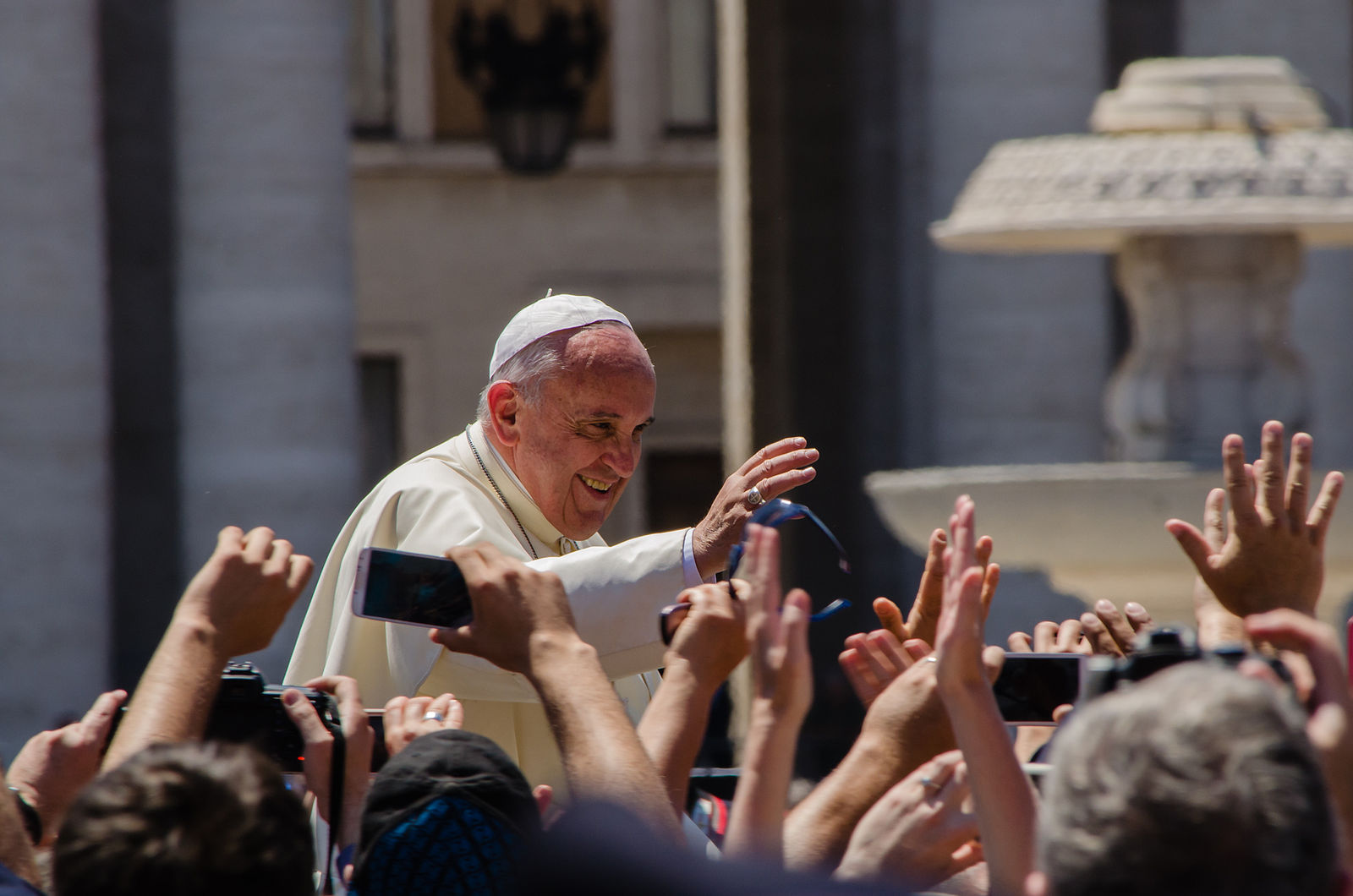Update: Pope Francis has sent Fr. James Martin a letter clarifying his initial statement in his Associated Press interview. We are adding additional coverage at the end of this article.
Pope Francis, in an historic interview with Nicole Winfield of the Associated Press, called for the first time for the decriminalization of homosexuality worldwide. “Homosexuality is not a crime,” he said. This represents an immense step forward for LGBTQ people, their families and friends, and will undoubtedly save lives.
The Catholic Church, said Pope Francis, must also actively work for the abolition of laws that criminalize homosexuality. Declaring such laws “unjust,” he called upon the entire church to oppose these laws. “It must do this. It must do this,” he said.
The Holy Father also spoke about Catholic bishops who actively support laws that criminalize homosexuality: “These bishops have to have a process of conversion,” he said, adding that they should apply “tenderness, please, as God has for each one of us.”
This is the first time that any pope has made such a clear call about this pressing issue. It is one of several stances that many have been encouraging the Vatican to take, particularly since it does not challenge church teaching. In 2019, in a meeting at the Vatican, attorneys and LGBTQ advocates urged the Holy See to issue a statement on the topic, also hoping to meet with the pope, who was not able to attend the gathering.
This is the first time that any pope has made such a clear call about this pressing issue.
In response to their request, Cardinal Pietro Parolin, the Vatican’s Secretary of State, reaffirmed the church’s teaching on the dignity of every human being and its stance opposing violence, though he stopped short of any statement supporting decriminalization.
(As an aside, Pope Francis was quoted in the AP interview as saying, “Being homosexual is a sin,” which is not church teaching. But, as the Italian journalist Gian Guido Vecchio commented, the video of the interview shows the pope is repeating this as an objection from those who favor criminalization, and replies: “But first let us distinguish between sin and crime. Lack of charity towards one’s neighbor is also a sin, so what?” And he concludes: “It’s not a crime, it’s a human condition.” Vatican News also affirmed this by explaining, “[A]s he often does in his preaching or interviews, the Pope imagined a dialogue between two people….”)
Significantly, the Holy Father’s statement also comes before his trip to South Sudan, where there is severe persecution of LGBTQ people. In some other parts of Africa, laws criminalizing homosexuality are common, particularly in predominantly Muslim countries.
For some people, the pope’s words may seem unsurprising or even bland. Most people (even those who believe that same-sex activity is sinful) are against jailing LGBTQ people and certainly oppose executing them. Even hard-liners believe that a sin is different than a crime.
But in almost 67 countries, as reported by AP, it is illegal to engage in homosexual relations, and is an act punishable by jailing. And in ten countries it is a capital offense, punishable by death. “Anti-sodomy” laws are also still on the books in several states in the U.S.
In the recent past, several Catholic bishops, and at least one bishops’ conference, have publicly supported such repressive laws. In Ghana, the Catholic bishops conference recently said, “homosexual practices [should be made] illegal in Ghana.”
In the recent past, several Catholic bishops and at least one bishops’ conference has publicly supported such repressive laws.
Other Catholic bishops, while not calling for imprisonment, have made disparaging remarks against LGBTQ people: for example, a bishop in Poland who called homosexuality a “plague.” Such statements serve to increase hatred of LGBTQ people and contribute to a culture of bullying, harassment and violence.
Overall, though, despite pleas from LGBTQ people suffering persecution, few bishops or bishops’ conferences, have condemned the criminalizing laws that the pope rejected today, even though this is, after all, a life issue.
As ever, Pope Francis is siding with life, with human dignity and with the belief that all of us are created in the image and likeness of God.
As he said today, “We are all children of God and God loves us as we are.”
Continued coverage of the pope’s remarks is available via the links below:
- Father James Martin, S.J., speaks with NPR on decriminalizing homosexuality
- Coverage of the pope’s interview in the New York Times
- WAMU, NPR’s Washington, DC, affiliate: What a Jesuit priest thinks of Pope Francis’s statement on homosexuality
- Vatican News: Pope sends letter to Fr. James Martin on homosexuality and sin
- AP: Pope clarifies homosexuality and sin comments in note
- La Repubblica: Gay, papa Francesco: il “peccato” va valutato in base alle circostanze (Italian)
- L’Osservatore Romano: Lettera del Papa a padre James Martin su omosessualità e peccato (Italian)
- La Nación: Francisco aclaró sus dichos sobre la homosexualidad en una carta a un sacerdote cercano a la comunidad LGBTQ (Spanish)
- Washington Post: Opinion: Why Pope Francis stood up for LGBTQ lives
- NCR: Pope clarifies homosexuality and sin comments in note
- Rome Reports: Pope Francis on homosexuality: “Every sexual act outside of marriage is sin” (video)



